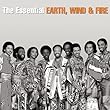 By Daniel Garrett
By Daniel Garrett
Earth, Wind and Fire,
The Essential Earth, Wind and Fire
Compilation produced by Leo Sacks and Maurice White
Sony, 2002
“Don’t hesitate ’cause the world seems cold. Stay young at heart…”
—Earth, Wind and Fire, “That’s the Way of the World”
Spiritual awareness and social conscience. There are different kinds of voices in Earth, Wind and Fire; voices high and light, broad and deep, voices singing about sky and mountains, and people being dismissive when all you need is a helping hand, or declaring a desire for sex, and affirming faith and will. Philip Bailey was probably the band’s best known singer, but other voices in the group included that of the drummer and kalimba-player Maurice White, bassist Verdine White, and guitarist Al McKay; and the band was completed by pianist Larry Dunn, percussionist Ralph Johnson, guitarist Johnny Graham, flutist and saxophonist Andrew Woolfolk, percussionist Fred White, and guitarist Roland Bautista. The members were augmented by many other musicians, including horn and string players, contributing to its big, big band sound. Maurice and Verdine White wrote many of the songs for this jazz-funk orchestra. Listening to the musical group Earth, Wind and Fire is like hearing a mature secular male chorus, people of the sun, able to sing with intelligence and passion of nature, love, and society, to a fusion music score made up of jazz, funk, ballads, and rock; music for rest, ritual, or rousing energies. It is music with a mission. People who know the work of the band say its name with a fervent admiration. “Give me the will to be free” a singer intones in “Keep Your Head to the Sky,” whereas “Shining Star” encourages the listener toward a better self. The band and its listeners are both involved in spiritual work in a stressful world: “A child is born with a heart of gold, but the way of the world makes his heart so cold.”
“Talking to yourself is fine, makes you feel much better. Know just where to draw the line,” advises a singer in the ballad “All About Love,” which makes a distinction between the social self and the inner life, and has a melody that would not be out of place on Broadway. The song “Reasons” acknowledges the games played for love and sex, admitting, “I’m in the wrong place to be real.” One of the band’s most popular songs is about the power of music: “when you feel down and out, sing a song. It’ll make your day” (and were it not for the galvanizing music, “Sing a Song” might be trite). The band did seem real, especially when one of its members made deep-voiced observations such as “You turn down love like it’s really bad. You can’t give what you never had” (in the song “Can’t Hide Love”), making enlightenment and seduction seem like two sides of the same coin.
Its fast rhythms and high energy could achieve a great deal: a communal jam that conjured children’s rhymes and adult pleasures, social observation and spiritual devotion. Truth could bind; fantasy could liberate. “I’ll Write a Song for You” has a sweetness that sometimes seems rare, and strange, among men; and it is moving to think of how true African-American men remained to tenderness for a long, long time in a hostile world. The instrumental “Drum Song” is even prettier. “What used to be happy is sad” and “yesterday was all we had” are some of the lyrics from “After the Love Has Gone,” and something—the expressive, free, high voice, and the strings—in the music is balm for the lyrics.
Daniel Garrett, a graduate of the New School for Social Research, and the principal organizer of the Cultural Politics Discussion Group at Poets House, is a writer whose work has appeared in The African, All About Jazz, American Book Review, Art & Antiques, The Audubon Activist, Black Film Review, Changing Men, Cinetext, Contact II, Film International, The Humanist, Hyphen, Illuminations, Muse Apprentice Guild, Offscreen, Option, Pop Matters, Quarterly Black Review of Books, Rain Taxi, Red River Review, Review of Contemporary Fiction, Wax Poetics, and World Literature Today. Garrett originated two internet logs: one focused on culture and social issues, “City and Country, Boy and Man,” and one focused on books, “The Garrett Reader.” He has been writing a novel, A Stranger on Earth.